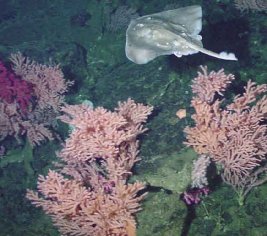12 September 2007
Countries urged to protect coldwater corals
Coldwater corals are long-lived animals that live along continental slopes, seamounts, and mid-ocean ridges. These corals are important parts of deep-sea ecosystems and provide habitat for other invertebrates and fishes. Coldwater corals can be damaged by fishing or other seafloor directed activities and may take centuries to grow back, if at all.

"Canada, Spain, Portugal and Russia are the countries that have the greatest potential to damage these globally important concentrations of corals," said Dr. Robert Rangeley, Vice President, Atlantic, WWF-Canada. "Their fleets are among the largest operating off Newfoundland and fish in and around the areas identified as hotspots. This also means they have the greatest opportunity to protect them."
"Our study mapped where corals are found, and identified areas where coral bycatch is highest for a variety of fisheries and gear types," said lead author of the study Dr. Evan Edinger. "Our research demonstrates that no matter what type of fishing gear is used, bottom-contact fishing in coral habitat damages corals. Therefore, it is very important that any areas established to protect corals exclude all bottom directed fishing activities." This research builds on a growing global movement to protect coldwater corals and seamounts. In 2006, the United Nations General Assembly called on fisheries management agencies like the Northwest Atlantic Fisheries Organization (NAFO) to implement vulnerable habitat protection measures by December 2008. In response, last year NAFO signalled their intent to protect seamount habitats.
The Report, Coldwater Corals off Newfoundland and Labrador: Distribution and Fisheries Impacts may be downloaded at: http://wwf.ca/coral
What do you think of this news item? Start a discussion.
Bookmark with: del.icio.us | Digg | Newsvine | NowPublic | Reddit
|
--
Subscribe to SCUBA News (ISSN 1476-8011) for more free news, articles, diving reports and marine life descriptions - http://www.scubatravel.co.uk/news.html

Labels: coral, environment, marine biology, research
 Subscribe to SCUBA News (ISSN 1476-8011) for more news, articles, diving reports, reviews and marine creature of the month.
(SCUBA News is published by SCUBA Travel once a month. Will will keep your e-mail address confidential and only use it to send you the monthly newsletter.)
Subscribe to SCUBA News (ISSN 1476-8011) for more news, articles, diving reports, reviews and marine creature of the month.
(SCUBA News is published by SCUBA Travel once a month. Will will keep your e-mail address confidential and only use it to send you the monthly newsletter.)
